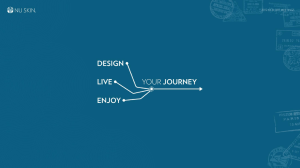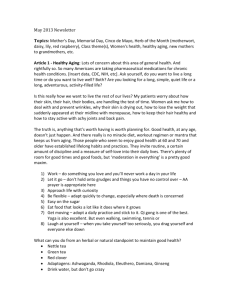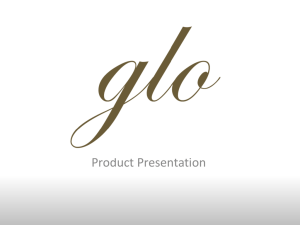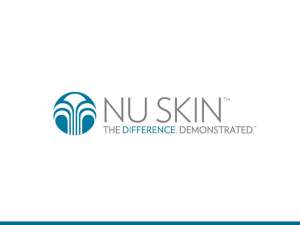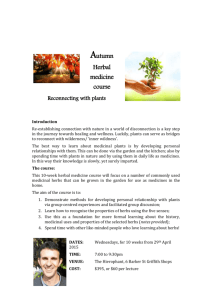Anti-Aging Herbs (2012)
advertisement
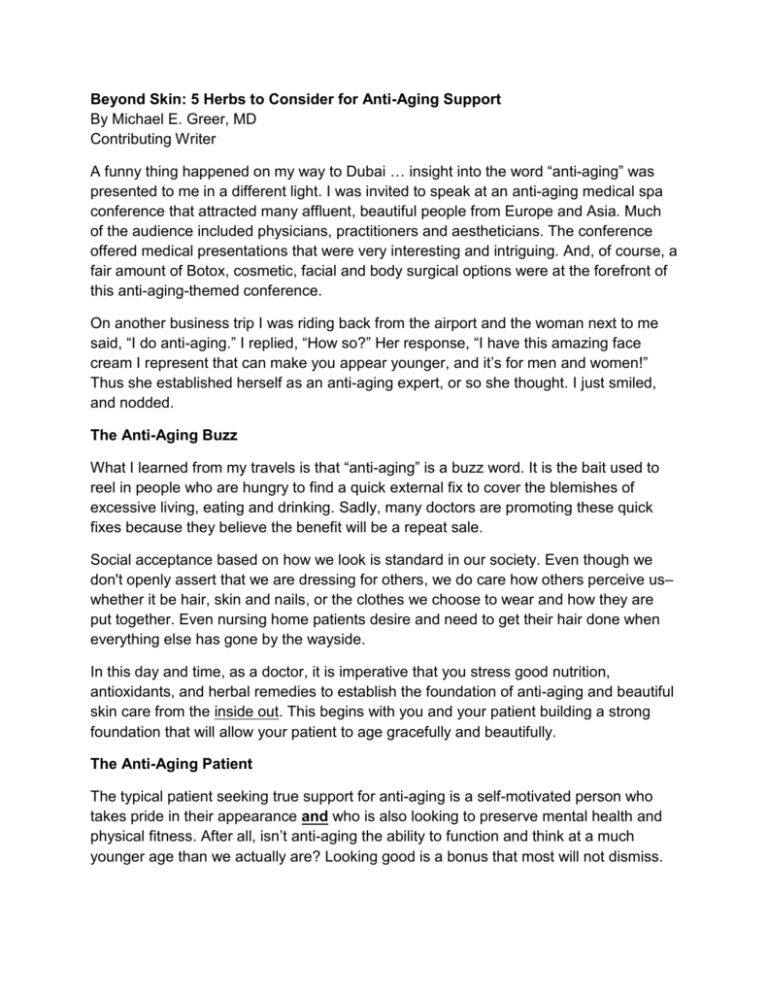
Beyond Skin: 5 Herbs to Consider for Anti-Aging Support By Michael E. Greer, MD Contributing Writer A funny thing happened on my way to Dubai … insight into the word “anti-aging” was presented to me in a different light. I was invited to speak at an anti-aging medical spa conference that attracted many affluent, beautiful people from Europe and Asia. Much of the audience included physicians, practitioners and aestheticians. The conference offered medical presentations that were very interesting and intriguing. And, of course, a fair amount of Botox, cosmetic, facial and body surgical options were at the forefront of this anti-aging-themed conference. On another business trip I was riding back from the airport and the woman next to me said, “I do anti-aging.” I replied, “How so?” Her response, “I have this amazing face cream I represent that can make you appear younger, and it’s for men and women!” Thus she established herself as an anti-aging expert, or so she thought. I just smiled, and nodded. The Anti-Aging Buzz What I learned from my travels is that “anti-aging” is a buzz word. It is the bait used to reel in people who are hungry to find a quick external fix to cover the blemishes of excessive living, eating and drinking. Sadly, many doctors are promoting these quick fixes because they believe the benefit will be a repeat sale. Social acceptance based on how we look is standard in our society. Even though we don't openly assert that we are dressing for others, we do care how others perceive us– whether it be hair, skin and nails, or the clothes we choose to wear and how they are put together. Even nursing home patients desire and need to get their hair done when everything else has gone by the wayside. In this day and time, as a doctor, it is imperative that you stress good nutrition, antioxidants, and herbal remedies to establish the foundation of anti-aging and beautiful skin care from the inside out. This begins with you and your patient building a strong foundation that will allow your patient to age gracefully and beautifully. The Anti-Aging Patient The typical patient seeking true support for anti-aging is a self-motivated person who takes pride in their appearance and who is also looking to preserve mental health and physical fitness. After all, isn’t anti-aging the ability to function and think at a much younger age than we actually are? Looking good is a bonus that most will not dismiss. It is very true that the fear of losing mental abilities and mobility is more threatening than the loss of physical appearances. The standard patient usually has family, children and/or grandchildren to chase after and will need to support both mentally, physically and sometimes financially. In my practice I have found sustained benefits from using herbal recommendations for anti-aging support. The Anti-Aging Herbs When a patient presents, a thorough discussion regarding options, expectations and desired results is initiated. The necessity to lift, carry, run and jump without pain or disability requires compliance with the prescribed nutritional plan that you and your patient establish. It is also important to establish the financial price tag that your patient is wishing to spend on their anti-aging regime which will benefit memory, mobility and outward appearance. I always tell my patients to establish a good foundation with a good quality omega-3 fish oil product with dosages of at least 1,000 mg taken in the morning and again before bedtime. With this, calcium and vitamin D are recommended in the morning and evening. The calcium dosage I recommend is 1,000 mg, and vitamin D can vary between 1,000 mg and 10,000 mg, depending upon the patient's vitamin D-3 level. In discussing all aspects of anti-aging, the underlying root cause of cell destruction is free radical formation that is unabated by nutrients and free radical fighters. The body is a very complex and beautiful system that is bathed in the extracellular matrix. Every tissue in the body is able to communicate with every other tissue in the body by way of cytokines and chemokines that are initiated from the T and B cells. How herbs affect modulation and interaction of the free radicals generated in day-to-day living is the key to anti-aging. I suggest herbs that offer efficient and enhanced benefits to the body. I have five favorite herbs for anti-aging support: Korean ginseng; ashwaganda; rhodiola; ginkgo; and milk thistle. Korean ginseng (Panax ginseng): One of my favorite herbs is Korean ginseng root which has a tonic and adaptogenic activity that is used traditionally in Western herbal medicine for physical and mental exhaustion and stress and immune system support (Morgan, M. A Phytotherapist’s Perspective, No. 137. April 2010). It is available to use as a dried or powdered root, liquid extract or tablet. Russian researchers in the 1960s defined herbs with adaptogenic activity as having the ability to enhance the body's nonspecific resistance to stress. Of the many adaptogens, Korean ginseng helps the body adapt to stress through regulation of the endocrine and immune systems via the hypothalamic-pituitary axis (Panossian A, Wagner H. Phytother Res. 2005; 19 (10):819-838). Western herbalists understand Korean ginseng to be useful for short-term support of the effects or the anticipated effects of stress, and its ability over a longer period of time to reduce the impact of the aging process. This is due to the herb’s ability to maintain the adrenal cortex in maximal response of condition (Mills SY. The Essential Book of Herbal Medicine. Penguin Arkana (Penguin), London. 1991). External studies have shown a sparing action of the adrenal cortex, mediated through the anterior pituitary and adrenocorticotropic hormone (ACTH ) release (Morgan, M. A Phytotherapist’s Perspective, No. 137. April 2010). In a large randomized study over a four-month period of time with the criteria of increased mental or physical stress or with fatigue in a population from 16- to 73-years old, the usage of Korean ginseng with vitamins and minerals versus patients taking vitamins and minerals without beneficial effect for quality life was confirmed (Morgan, M. A Phytotherapist’s Perspective, No. 137. April 2010). The dosage of the Korean ginseng extract was equivalent to 0.2 g/day of dried root. Ashwaganda (Withania somnifera): Ashwaganda root is considered a rejuvenating tonic in Ayurvedic medicine. Studies have shown ashwaganda as having adaptogenic properties (Mills S, Bone K. Principles and Practice of Phytotherapy: Modern Herbal Medicine. Churchill Livingstone, Edinburgh. 2000). The herb encourages healthy response to environmental stresses and promotes the body’s ability to recover from a weakened state, as well as helps increase longevity (Bhattacharya SK, Muruganandam AV. PharmacolBiochem Behav. 2003 June; 75(3):547-55). And ashwaganda demonstrated an ability to help support improved sleep quality, physical capabilities, responsiveness and alertness (Roy AS et al. International Seminar -Traditional Medicine, Calcutta. Nov. 7-9, 1992. p. 161). It can be used as a dried root, liquid extract or tablet. An average therapeutic dose would be equivalent to five to seven grams of the root per day. Rhodiola (Rhodiola rosea): Sometimes called arctic root because it thrives in arctic regions, including Siberia and northern parts of Europe, rhodiola, as a traditional medicine, is regarded as an adaptogen and tonic to support physical endurance and longevity, enhance mental clarity and support cognitive function, and encourage resistance to high altitude sickness. Rhodiola is also considered a valuable herb to help reduce fatigue and depression, and to support the nervous system (Morgan M, Bone K. A Phytotherapist’s Perspective No. 47. Feb. 2005). I like to recommend the herb in tablet form and prefer a dose that will deliver 6 to 12 grams a day in divided doses, and I find it combines exceptionally well with Korean ginseng for boosting energy when needed. Ginkgo (Ginkgo biloba): This herb is well known for, and research confirms, its benefits for promoting healthy circulation in the body, including cerebrovascular circulation (Quiroga H. Orientacion Med 1982; 31 (1281): 201-202). A study on longevity in 3,534 elderly French farmers without dementia was conducted from 1988 to 2001. In the long term, there was a much lower risk of mortality in the group who took ginkgo (Dartigues JF, Cargill L, Helmer C, et al. J Am Geriatr Soc. 2007; 55(3): 395-399). Other studies demonstrated long term use of ginkgo (at least two years) reduced the plasma levels of amyloid beta protein 42, which is considered a risk factor for Alzheimer’s (Morgan, M. A Phytotherapist’s Perspective No. 137 April 2010). Clinical evidence indicates that ginkgo supports peripheral nerve health and vascular endothelial function in patients with neuropathy (Li XS et al. Chin J Integr Med. 2009; Smirnova V et al.Diabetologia 1999). Studies have shown the therapeutic daily dose is 120 to 240 mgs of the standardized concentrated 50:1 extract, either in liquid or tablet form. Milk thistle (Silybum marianum): This herb contains flavanolignans, collectively known as silymarin, as its active ingredients. These act to protect the liver cells from toxic damage and inflammation. This is particularly important since our exposure to environmental and chemical toxins has increased significantly in the last few decades. In a study, milk thistle has demonstrated an ability to lower liver enzymes in patients with non-alcoholic fatty liver disease taking it for two months (Hajaghamohammadi AA etal. Hep Mon. 2008). Fairly recently, it has been observed that milk thistle may be of value for a person with insulin resistance, possibly by increasing insulin sensitivity in peripheral tissues (Hussain SA. J Med Food. 2007). This herb is available in tablet and liquid form. A quality milk thistle extract has been standardized to contain 70 to 80 percent silymarin; the usual dosage is 210 to 1,050 mg of milk thistle extract per day in divided doses (this equates to 160 to 840 mg of silymarin per day). Beyond the Buzz An emerging theory of aging that is gaining respect in the field of anti-aging is that there is a decline in immune function resulting in “inflamm-aging” as it relates to a new and different “oxidative and inflammatory damage to tissues.” Keywords pertaining to this complex and intriguing theory are heat shock proteins (HSP's) and sirtuin 1. Sirtuin1 (SIRT1), senses cellular stress and activates multiple genes that code for protective proteins such as antioxidants and cell-membrane stabilizers (Mattson M, Calabrese. The New Scientist. 2008; 199(2668):36-39). So while “anti-aging” is a buzz word right now, for practitioners who are truly committed to helping their patients age gracefully, real anti-aging goes much further than skin deep. It starts with diet, hydration, nutrition, lifestyle, and a little help from the plant world. Michael Greer, MD, is an integrative medicine specialist focused on holistic, herbal, homeopathic, and naturopathic solutions for health. He incorporates the best of conventional medicine with natural medicine products and philosophies. Following a 20year career as a board-certified (1984) OB/GYN, Dr. Greer is retired from the practice of medicine and is now focused exclusively on educating physicians about integrative medicine.
